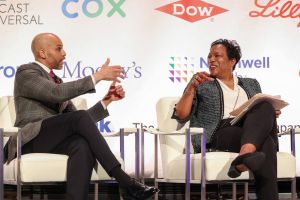By Blair Sheppard, global Leader of strategy and leadership development at PwC (No. 5 on the Fair360, formerly DiversityInc Top 50 Companies list)

Blair Sheppard
We are confronting a fundamental issue in the world today: how to handle the growing disparity in wealth and erosion of the middle class throughout the world. This was highlighted in Oxfam’s recent report and is recognized by the CEOs surveyed for our recently released 20th CEO Survey; 44 percent of them said that globalization has done nothing to close the gap between rich and poor.
Two factors are at the root of this challenge: technology and lack of investment in the future. But to really respond to the challenge requires us to think differently about potential responses. Currently we are applying 20th Century logic to a 21st Century problem. And this sets us up for failure.
The first and most important creator of growing wealth disparity is technology. Machine intelligence and robotics are already systematically replacing attractive and high paying work, making a few people even wealthier, while hitting two groups especially hard: the middle aged who are difficult to re-train and the young, who find many entry-level roles now automated and have not been prepared for other, yet to be identified, roles. This affects both wealthy countries with a higher average age (e.g. Germany at 48.5 years) and some of the poorest and youngest countries (e.g Nigeria at 18.5), who can no longer compete in their traditional, labor intensive ways.

The second factor likely to exacerbate the problem is one I am somewhat embarrassed to admit as a former Dean of a business school: the declining rate of investment around the world. Uncertainty in political and economic markets, the decline in trust in institutions and the formal modelling of financial cost-benefit analysis has made us more risk averse and less likely to invest in work-creating ideas at a time of accelerated job extinction.
But most problematic is our reluctance to question and adapt our established ways of thinking to a new paradigm. Yes, taxes are an important solution to the problem, but not if they simply enhance the wealth of those already most benefiting. Yes, investing in job creating industries is a good idea, but not if the solution is unsustainable. Yes, focusing on local job creation is an answer, but not if we do so by reducing healthy trade. Yes, wealth redistribution is part of the solution, but not if it comes without the means to build a productive life and career.
What might a different approach look like The answer requires imagination, or perhaps more appropriately re-imagination. Re-imagining life and a career as a series of related but quite different roles. Re-thinking the meaning of work and leisure. Re-defining national growth so it includes concern for job growth and resilience as well as GDP. Re-focusing our governments’ attention on the city, where the challenges are more tractable. Re-imagining the role and obligations of the wealthy.
And finally re-imagining what it means to be human. For, while a little scary, this act of re-imagination has the potential to unlock new levels of freedom, creativity and opportunity for all of humanity.
Blair leads the team that focuses on strategy and leadership for the PwC network. He is also Professor Emeritus and Dean Emeritus of Duke University’s Fuqua School of Business.


















